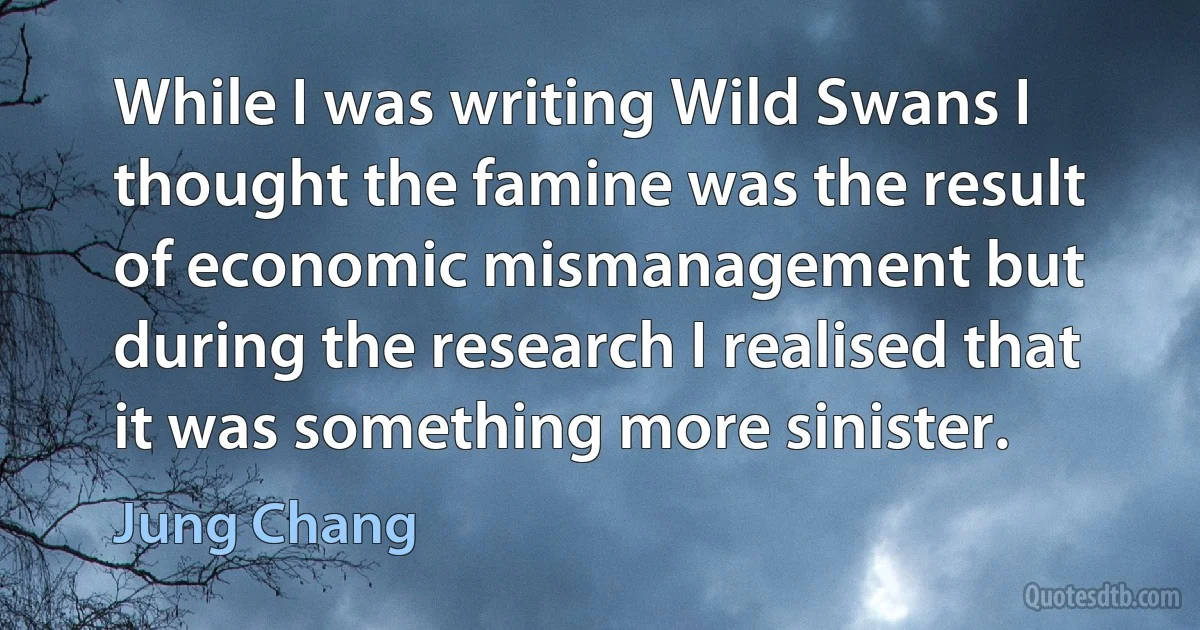Famine Quotes - page 5
I attacked the English of the Northern Shires like a lion. I ordered their houses and corn, with all their belongings, to be burnt without exception and large herds of cattle and beasts of burden to be destroyed wherever they were found. It was there I took revenge on masses of people by subjecting them to a cruel famine; and by doing so - alas!

William I of England
Sure must be a great consolation to the poor people who lost their stock in the late crash to know that it has fallen in the hands of Mr. Rockefeller, who will take care of it and see it has a good home and never be allowed to wander around unprotected again. There is one rule that works in every calamity. Be it pestilence, war, or famine, the rich get richer and poor get poorer. The poor even help arrange it.

Will Rogers
The sun is still the number 1 factor in our energy balance. No matter how much people argue about CO2, they can't successfully explain the pre industrial revolution 900-1300AD Medieval Warming Period or the cold 1645-1715 AD Maunder Sunspot Minimum that coincided with European crop failure, famine and disease while linking it with our modern day issues with CO2 to climate change. Yet sunspots and solar cycles can and do explain both.

Anthony Watts
I wish I could view the belly that oozes over the top of my pants as a badge of maternal honor. I do try. I make sure that the women whose looks I admire all have sufficient fat reserves to survive a famine, and I make a lot of snide comments about the skeletal likes of Lara Flynn Boyle and Paris Hilton.

Ayelet Waldman
Death, disease, famine
homelessness, abuse
I can't even watch
the 5 o'clock news
There could be an answer
it may not be too late
but it involves a transfer
try love instead of hate
All you can do
is be good to people
and hope that those people
will be good to you too
but good luck
I doubt it.

Ellen DeGeneres
The metaphor of the watch was very much used by the deists. And of course, watches run down, and break down, and it was believed by many of them that if an intelligence had begun the universe, begun the process, he'd took no further interest in it - didn't intervene in human affairs, didn't mind who won the war, didn't mind which country was the leading one, watched with relative-well, or didn't watch-with indifference, plague, famine, war and so forth. That's a very hard position to oppose, by the way. It's impossible, actually, to disprove - one can only the evidence for it isn't quite strong enough to be persuasive. To be a theist, to be a member of a monotheistic religion, that believes that truth has been revealed, that god has intervened in human affairs, that he has a plan for us - each of as individually and as a species, and that it shows - is a very much more difficult undertaking. I'm gonna show why I think it's more or less impossible.

Christopher Hitchens
A little, with the blessing of God upon it, is better than a great deal, with the encumbrance of His curse; His blessing can multiply a mite into a talent, but His curse will shrink a talent into a mite; by Him the arms of the wicked are broken, and by Him the righteous are upholden: so that the great question is, whether He be with or against us, and the great misfortune is, that this question is seldom asked. The favour of God is to them that obtain it a better and enduring substance, which, like the widow's barrel of oil, wasted not in the evil days of famine, nor will fail.

George Horne
Let's face it - think of Africa, and the first images that come to mind are of war, poverty, famine and flies. How many of us really know anything at all about the truly great ancient African civilizations, which in their day, were just as splendid and glorious as any on the face of the earth?

Henry Louis Gates
All the knives and forks were working away at a rate that was quite alarming very few words were spoken and everybody seemed to eat his utmost in self-defence, as if a famine were expected to set in before breakfast time to-morrow morning, and it had become high time to assert the first law of nature.

Charles Dickens
The tragedy of Africa seemingly has no end. Viewing it from afar, the casual Western onlooker can be forgiven if the scenes begin to meld: Ethiopian famine in 1987, Somalian civil war and ensuing famine in 1992, and now Central Africa in 1997. The pictures and footage assume the role of media footnotes: snapshots of hopelessness, disaster, and death that seem as far away as the moon and as unrealistic as some science fiction film. Yet, like the African crises before it, the tragedy of Central Africa is very real and, in a global age, perhaps not as distant as some would like to think. With a foreign policy appropriately rooted in some sense of humanitarian decency, the Central African crisis will not be easily ignored by American policymakers. It screams for remedy.

Michael Johns



